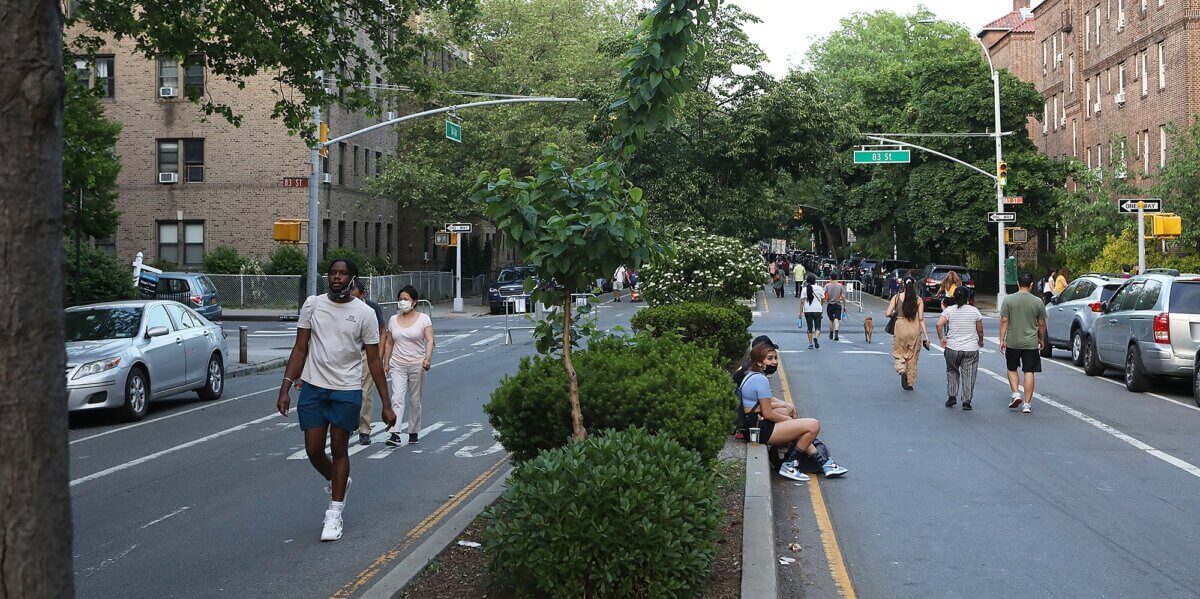Lawsuit says Open Streets program for green space projects violates the ADA
By Naeisha Rose/Queens Chronicle
The grassroots effort to formalize the reclamation of public space for an Open Streets program on a stretch of 26 blocks in Jackson Heights is taking shape.
Last Wednesday, 46 members of the City Council approved the renaming of the corridor along 34th Avenue from 69th Street to Junction Boulevard to Paseo Park, a nod to the predominantly Hispanic neighborhood, as paseo means stroll or promenade in Spanish.
Five councilmembers were absent, on medical leave or abstained from voting.
Leading the charge for the co-naming, which is expected to take place spring 2024 if Mayor Adams signs the bill, is Councilman Shekar Krishnan (D-Jackson Heights), the prime sponsor of Intro. 1278.
“… Paseo Park is the incredible story of a community coming together during a crisis to create new open space, filling it with families, music, and joy,” Krishnan, chair of the Committee on Parks and Recreation, said in a statement. “Our entire community is grateful for the tireless work of the 34th Avenue Open Streets Coalition and Alliance for Paseo Park …”
The Alliance for Paseo Park and 34th Avenue Open Streets Coalition are two groups that were formed in spring 2020, the height of the spread of the Covid-19 virus. Both organizations wanted to address the lack of green space in Jackson Heights as the neighborhood ranks last in the city for per capita park space, while also being in the eighth-most densely populated ZIP Code, 11372, in the United States.
Paseo Park would create up to 7.5 acres of green space, quadrupling the park space available in Jackson Heights. Since the city’s pandemic Open Streets program there three year ago, crashes in the area decreased 42 percent, the space was improved with new surfacing and planters and approximately 7,000 children from seven public schools, a private school and three universal pre-K institutions are able to travel through the park, according to Krishnan’s office.
While Paseo Park is being touted as the “gold standard” for the city’s Open Streets program, some detractors of it, as well as of similar projects throughout the city, do not consider it a jewel in their eyes.
A complaint filed in the Eastern District of New York by 11 people — a 12th person dropped out of the lawsuit — claims that the Open Streets initiative, which takes away roadway for public parks and pedestrian plazas, is in violation of the American with Disabilities Act and the Rehabilitation Act, along with city and state Human Rights laws.
Matthew Berman, the attorney representing the plaintiffs, said his clients are not challenging the entire citywide program, but specific Open Streets projects.
“… although changes to these particular streets may result in broader changes,” Berman said.
Berman added that the ADA and the Rehabilitation acts require equal access to streets and sidewalks for the disabled, especially for programs using federal funds.
“The upshot is that the city is required to provide reasonable accommodations to the disabled so that they have equal access and the city has failed to do that,” he said.
Open Streets programs are expensive and resource–intensive, and despite grants from the city, they also rely on the availability of federal and state funding, according to neighborhoodcommons.nyc.
The Chronicle reached out to Krishnan’s office about the lawsuit, but he was not available for comment.
UPDATE: This story was updated to say that the attorney’s name is Matthew Berman.
Read the article from Queens Chronicle here.


